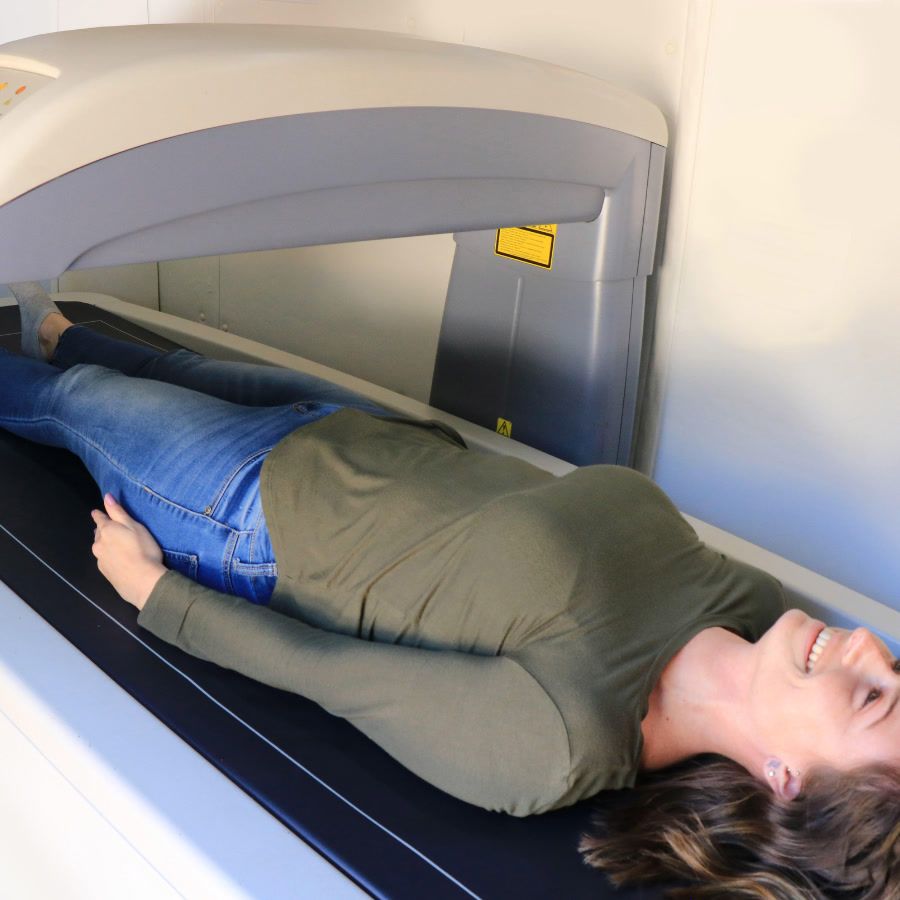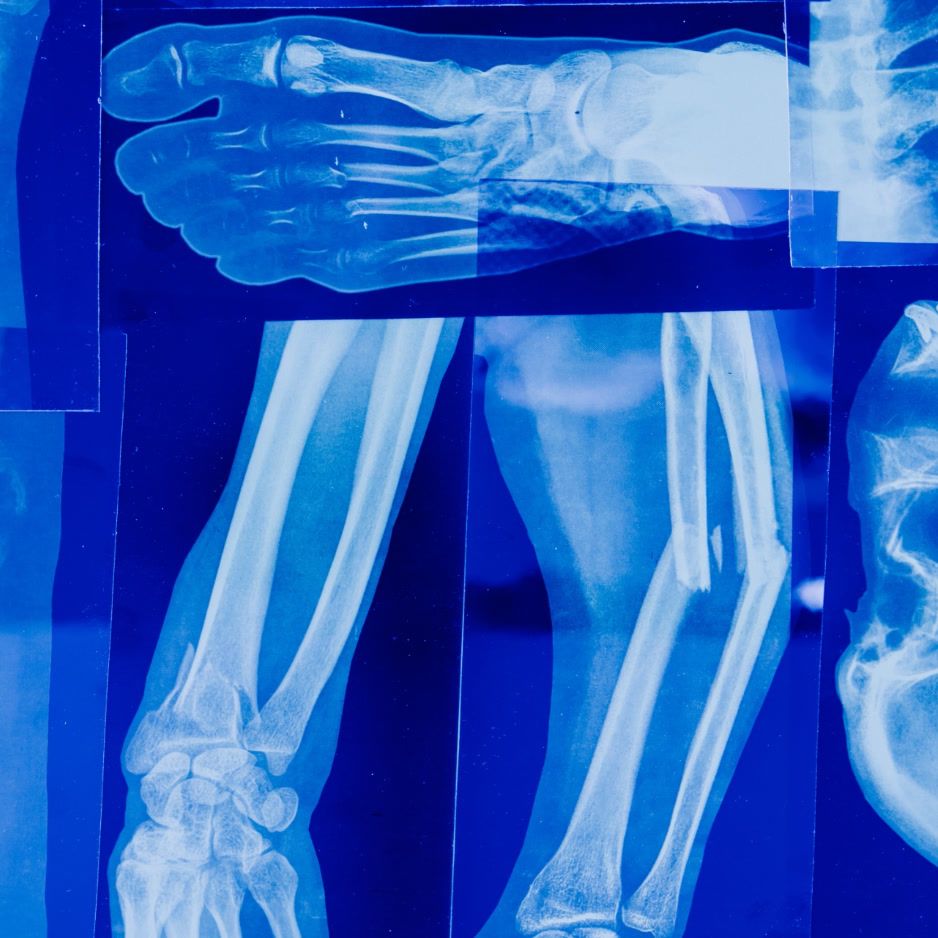What Is Visceral Fat?
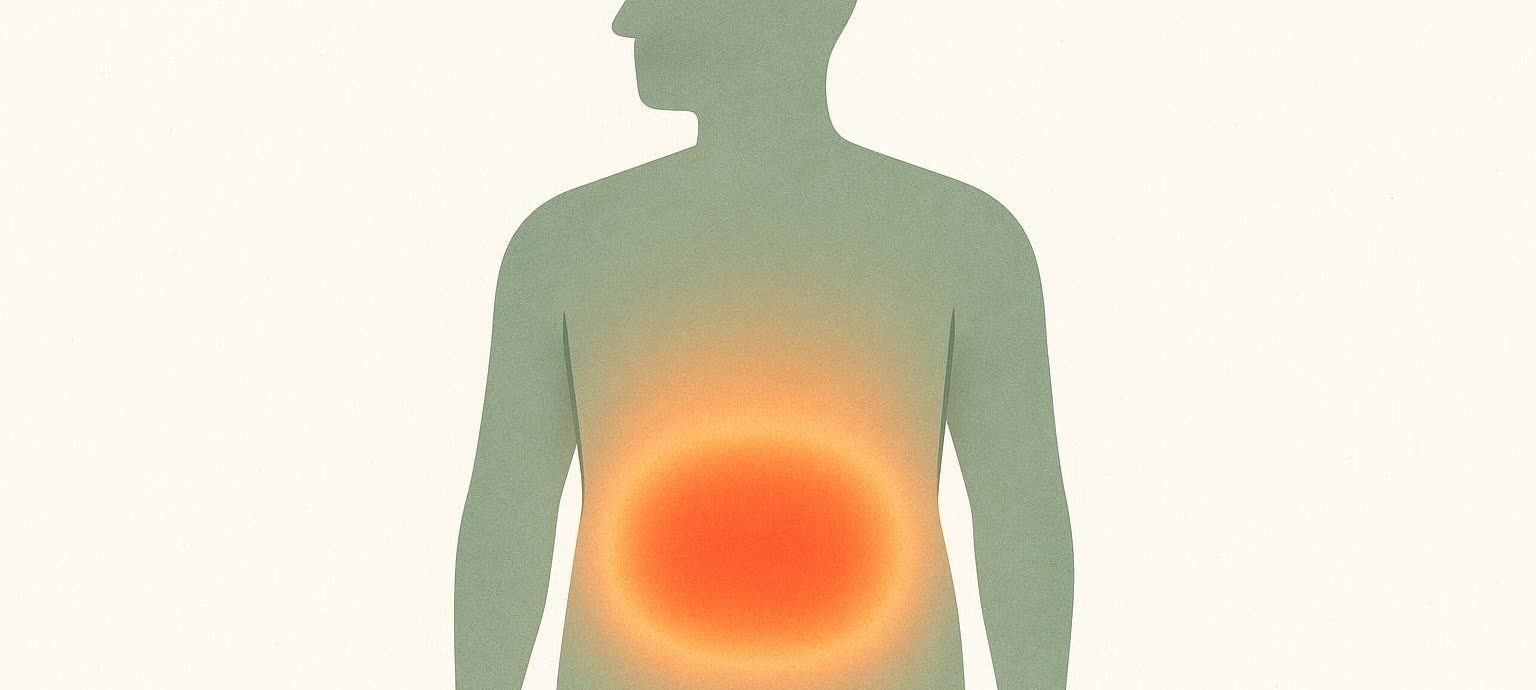
What Is Visceral Fat?
Visceral fat is a layer of adipose tissue that accumulates behind your abdominal wall, wrapping around internal organs like the liver, pancreas, and intestines. It makes up only about 10 percent of total body fat (Harvard Health). Despite its small share, visceral fat functions as an active endocrine organ—pumping out hormones and inflammatory molecules that pose a far greater cardiometabolic threat than the softer, pinchable subcutaneous fat under your skin.
In this comprehensive guide, you’ll learn:
- What visceral fat is and how it disrupts metabolism
- Waist-size thresholds linked to higher disease risk
- Reliable at-home and clinical measurement options
- Evidence-backed diet, exercise, and lifestyle tactics to reduce it effectively
- Special considerations for age, gender, and ethnicity
Visceral Fat 101: More Than “Belly Fat”
Most adults carry two primary fat depots:
| Fat Type | Where It Lives | Primary Role |
|---|---|---|
| Subcutaneous | Just beneath the skin (e.g., abdomen, hips, thighs, arms) | Energy storage, insulation |
| Visceral | Deep inside the abdominal cavity, surrounding organs | Hormone & cytokine production, inflammatory signaling |
Visceral fat secretes inflammatory substances (cytokines)—including interleukin-6 and tumor-necrosis-factor-α—that can disrupt insulin signaling and raise blood pressure (Diabetes Journal). This inflammatory activity explains why people with a “normal” BMI can develop metabolic disease if their visceral levels are high—one reason BMI alone often misses the mark (Why BMI Fails to Measure Visceral Fat).
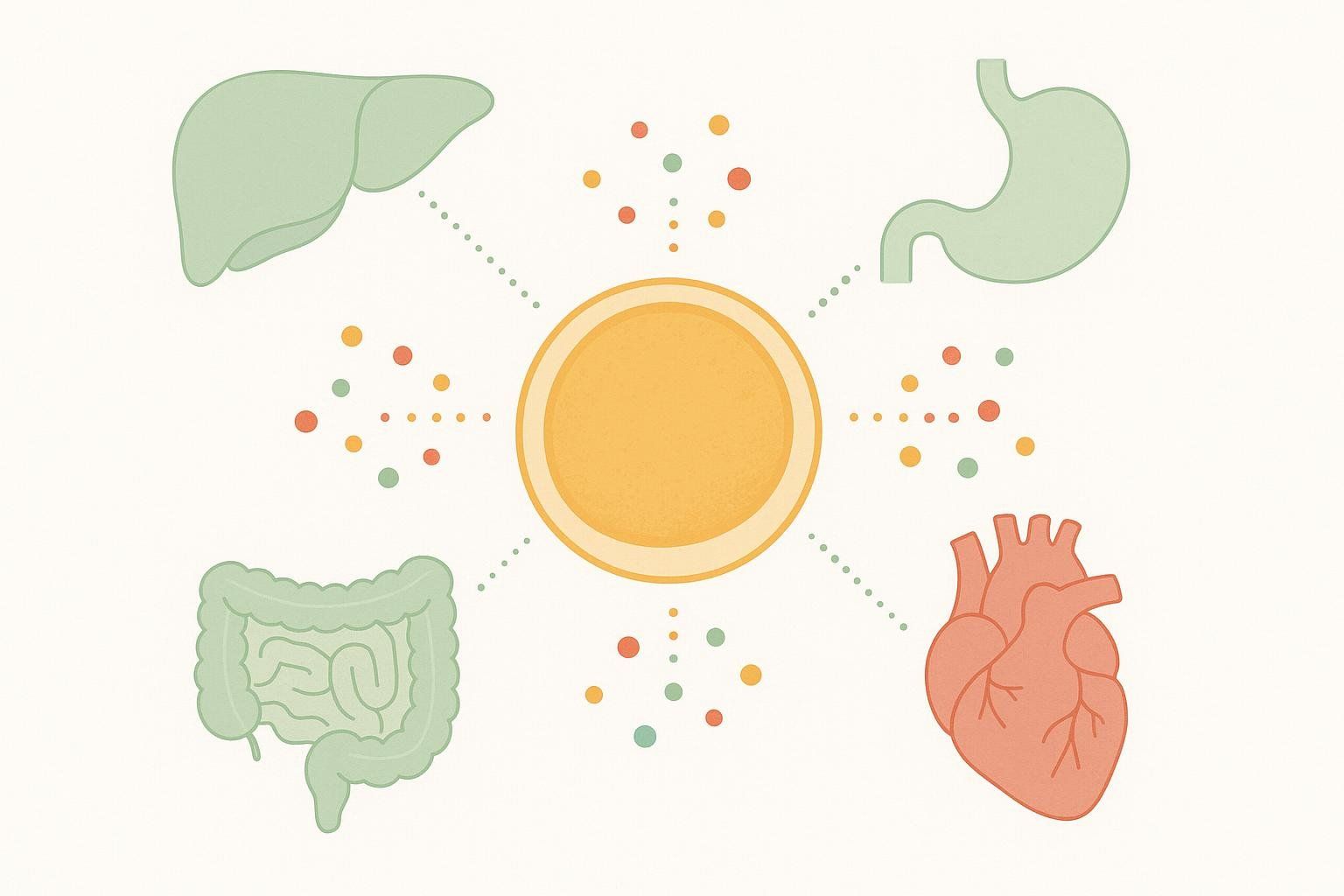
Key Takeaways
- Visceral fat drives a disproportionate share of disease risk relative to its size.
- Because it sits behind the abdominal wall, you can’t pinch or see it—objective measurement is essential.
Why Visceral Fat Matters
Large population studies tie elevated visceral fat to multiple chronic conditions:
- Cardiovascular disease – Women with the largest waists had 2× the heart-disease risk versus those with the smallest waists, even after adjusting for other factors (Harvard Health).
- Type 2 diabetes & insulin resistance �– Visceral fat releases fatty acids directly into the vein that feeds the liver (the portal vein), making the liver less responsive to insulin (Cleveland Clinic).
- Hypertension – Visceral fat can overactivate a hormone system that regulates blood pressure, nudging readings higher (Frontiers in Cardiovascular Medicine).
- Dementia & cognitive decline – Mid-life abdominal obesity nearly tripled dementia risk in later years (Neurology).
- Breast & colorectal cancers – Higher visceral fat is associated with increased odds of both cancers, independent of BMI (Cancer Epidemiology Biomarkers & Prevention).
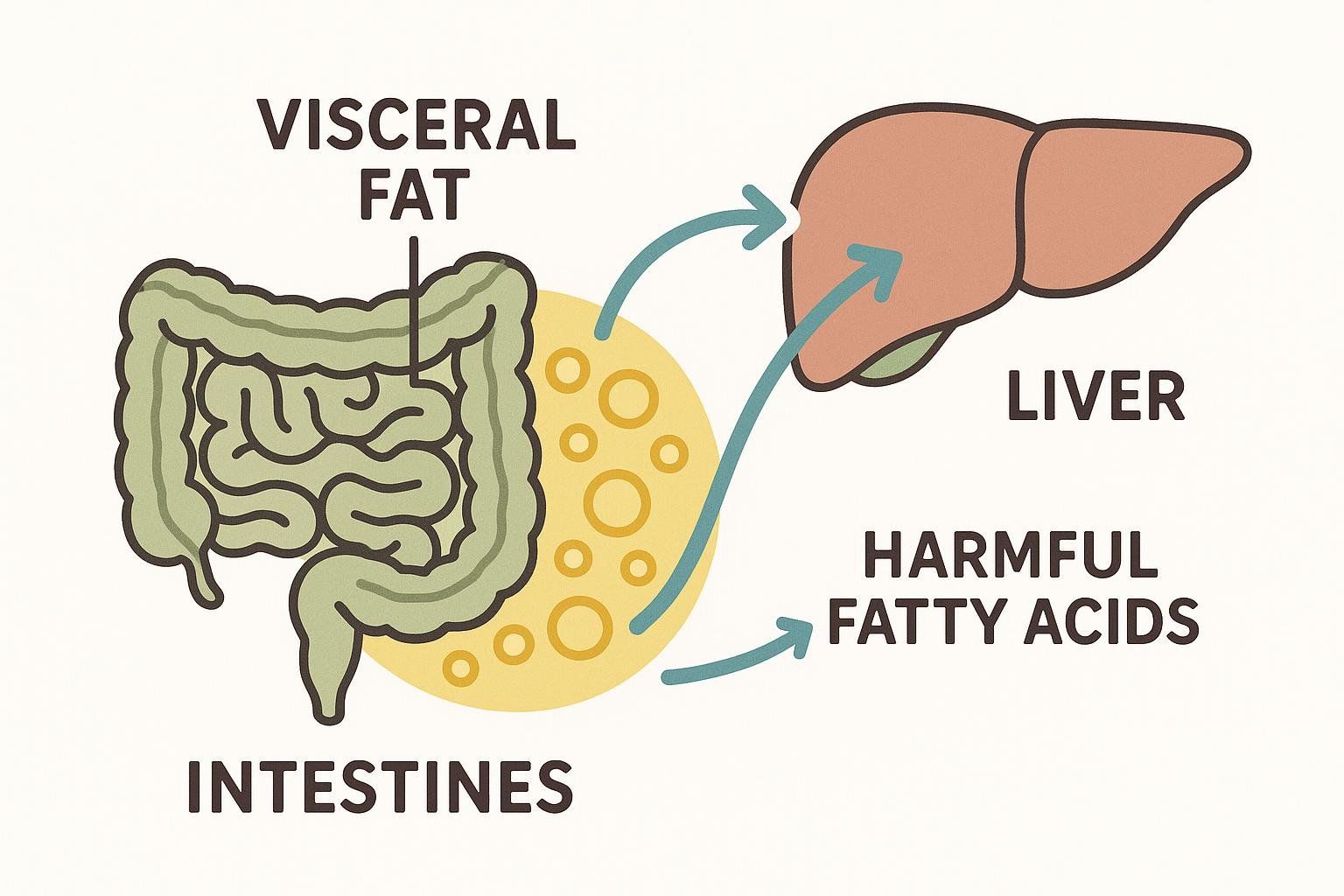
At-a-Glance Metrics
| Metric | Women | Men | Evidence |
|---|---|---|---|
| Waist circumference (risk threshold) | ≥ 35 in (88 cm) | ≥ 40 in (102 cm) | Harvard Health |
| Waist-to-height ratio (risk threshold) | > 0.5 | > 0.5 | BMJ Open 2022 |
| Average DEXA visceral-fat mass* | ~1 lb (0.45 kg) | ~2 lb (0.9 kg) | NHANES 2017–2018 |
*Population means from NHANES. Individual risk cut-offs can vary by age, ethnicity, and health status—discuss personal thresholds with your clinician.
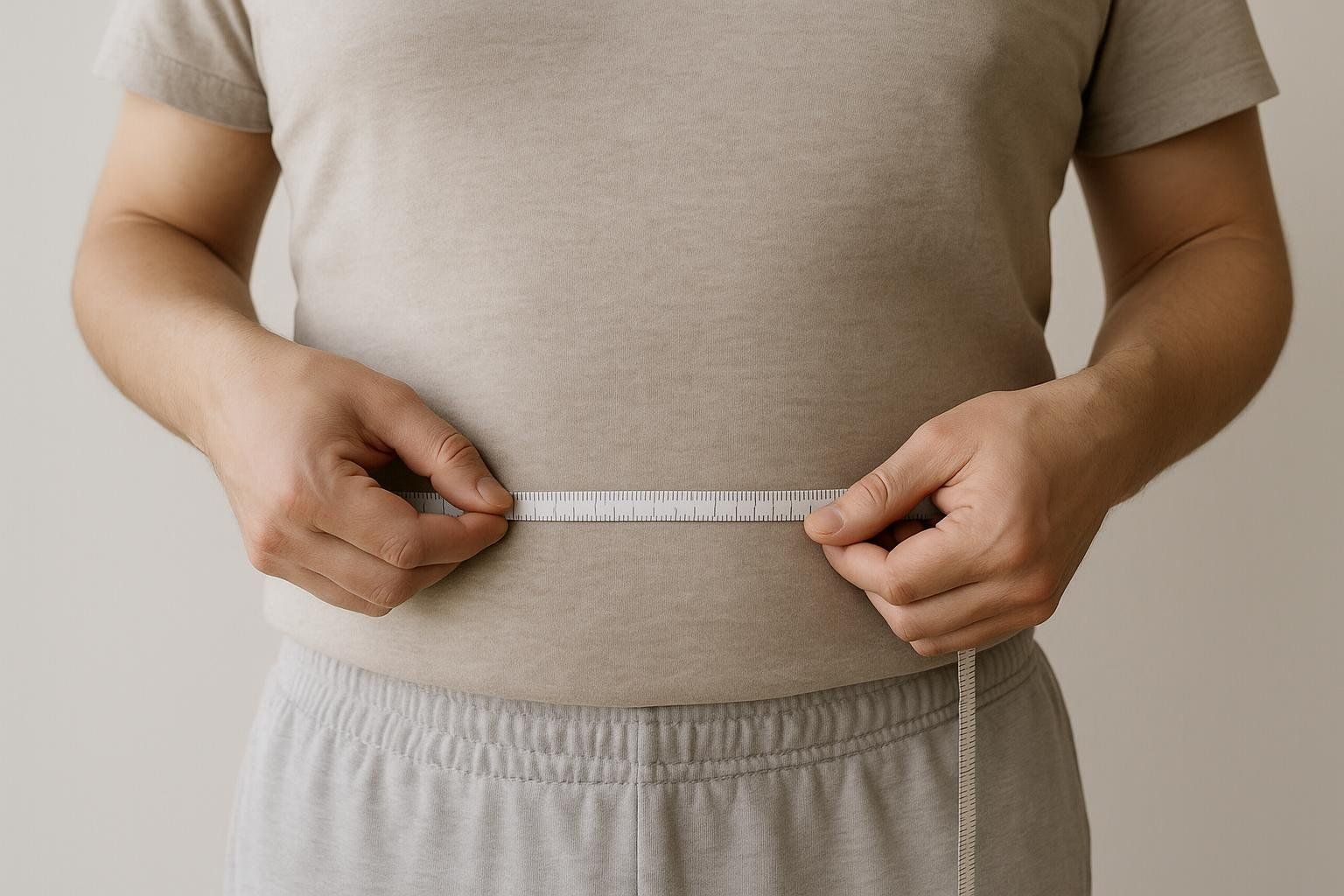
How Do You Know If You Have Too Much Visceral Fat?
DIY Tape-Measure Test (5 Steps)
- Stand tall, exhale normally, and relax your abdomen.
- Place a flexible tape level with your navel (not at the narrowest part of your waist).
- Keep the tape parallel to the floor—snug, not compressing.
- Note the measurement to the nearest ⅛ inch / 0.5 cm.
- Re-measure every 4–6 weeks to spot trends.
Quick check: A waist-to-height ratio above 0.5 signals it’s time to intervene.
Clinical & Tech-Forward Options
| Method | Detects Visceral Fat? | Accuracy | Typical Cost | Pros | Cons |
|---|---|---|---|---|---|
| Tape / Waist Circumference | Indirect | Low–Mod | $0 | Free, fast | Influenced by posture & bloating |
| Waist-Hip Ratio | Indirect | Moderate | $0 | Adds body-frame context | Similar limitations |
| DEXA Scan | Direct (accurately estimates mass) | High | ≈ $40–$70 | Comprehensive composition, minimal radiation | Requires appointment |
| CT Scan | Direct | Very High | $500 + | Precise organ images | Higher radiation, expensive |
| MRI | Direct | Very High | $700 + | No radiation | Cost, longer scan time |
Looking for accurate & precise data without hospital-tier prices? BodySpec’s storefronts & mobile DEXA clinics deliver gold-standard visceral-fat analysis in under 10 minutes.
How Do I Reduce My Visceral Fat? Key Strategies
Visceral fat is metabolically active, so it often shrinks faster than subcutaneous fat once healthy habits are in place. Here are six evidence-based strategies:
- Run a Calorie Deficit You Can Stick To
A moderate calorie deficit (≈ 15–25 %) delivered through whole-food meals consistently outperforms crash dieting for lean-mass retention and long-term maintenance (Obesity Reviews). - Prioritize Protein & Produce

Aim for 0.7–1 g protein per pound of goal body weight (1.6–2.2 g/kg), a range endorsed by the International Society of Sports Nutrition (ISSN) Position Stand. Fill half your plate with high-fiber vegetables to blunt blood-sugar spikes and keep you full.
Pressed for time? Greek yogurt + berries or a turkey-avocado wrap delivers protein and fiber in minutes.
- Do High-Intensity Interval Training (HIIT)

Systematic reviews show HIIT produces significant visceral-fat reductions, often outperforming moderate-intensity cardio when programs last 8–12 weeks (Sports Med 2018 meta-analysis). Two HIIT workouts per week paired with daily walking is a time-efficient combo.
4. Build Muscle with Resistance Training
Compound lifts (squats, rows, presses) 2–4 days/week preserve lean mass and improve insulin sensitivity—key for mobilizing stubborn belly fat (Willis et al., J Obes 2012).
- Significantly Reduce Alcohol Intake

Alcohol delivers 7 empty calories per gram and shifts liver metabolism toward fat storage. Large cohorts show heavy drinkers carry significantly more visceral fat than light or non-drinkers, even at similar BMIs (Kim et al., Clin Endocrinol 2012).
- Cap intake at ≤ 7 standard drinks per week for women and ≤ 14 for men, with at least 2 consecutive alcohol-free days.
- Trade beer or sugary cocktails for sparkling water with citrus or a low-sugar mocktail.
- Master Recovery Levers

- Sleep 7–9 hours/night. Chronic sleep loss ramps up hunger hormones and cortisol, stalling fat loss (Harvard Health).
- Manage stress. Two 5-minute breathing drills per day can lower cortisol levels linked to abdominal fat accumulation (Current Obesity Reports 2021).
Special Considerations
Hormones & Life Stage
- Menopause: Falling estrogen shifts storage from hips to abdomen. Resistance training plus adequate protein blunt this effect.
- Andropause: Declining testosterone in older men reduces muscle mass and increases visceral fat; lifting and quality sleep help.
Ethnicity & Risk Thresholds
Certain populations experience metabolic complications at lower waist sizes—e.g., ≥ 31 in (80 cm) for Asian women and ≥ 35 in (90 cm) for Asian men (Diabetes Care). Discuss individualized cut-offs with your clinician.
Tracking Progress: From Tape to DEXA
- Measure your waist monthly.
- Schedule a BodySpec DEXA scan every 3–4 months to validate changes in visceral fat, lean mass, and bone health.
- Log your data. A simple spreadsheet—or your BodySpec dashboard—helps you visualize trends and stay accountable.
For real-world inspiration, see how clients cut visceral fat in The Impact of Weight Loss on Visceral Fat.
Frequently Asked Questions
1. What burns visceral fat the fastest?
High-Intensity Interval Training (HIIT) paired with a protein-forward calorie deficit consistently outperforms moderate cardio for trimming visceral fat over 8–12 weeks (Sports Med 2018 meta-analysis).
2. How do I reduce my visceral fat?
Create a sustainable calorie deficit, lift weights, add 2 HIIT sessions per week, sleep 7–9 hours, and significantly limit alcohol. Track progress with waist measurements and periodic DEXA scans.
3. Is 7 a good visceral fat?
A rating of 7 typically refers to the unitless scale used by certain consumer bioelectrical-impedance devices (e.g., Tanita), where values 1–12 are labeled "healthy" (Tanita Europe). A DEXA scan, by contrast, reports visceral fat in pounds or kilograms. Here, thresholds for concern begin around 1–2 lbs (0.45–0.9 kg) for most adults, so "7 lbs" would be very high. Always confirm which measurement system you’re using.
4. Is visceral fat harder to lose?
Surprisingly, no. Visceral fat responds faster than subcutaneous fat once you improve diet, exercise, and sleep because it’s more metabolically active and receives richer blood flow.
5. Can liposuction remove visceral fat?
No. Surgical fat removal targets subcutaneous stores; visceral fat lies beneath the abdominal wall and cannot be suctioned out.
The Bottom Line
Visceral fat may be out of sight, but its metabolic effects are measurable—and manageable. Equip yourself with a tape measure, a strategic action plan (including curbing alcohol), and periodic DEXA scans to keep this stealthy fat depot in check.
Find a BodySpec scan near you and turn hidden risk into visible results.
